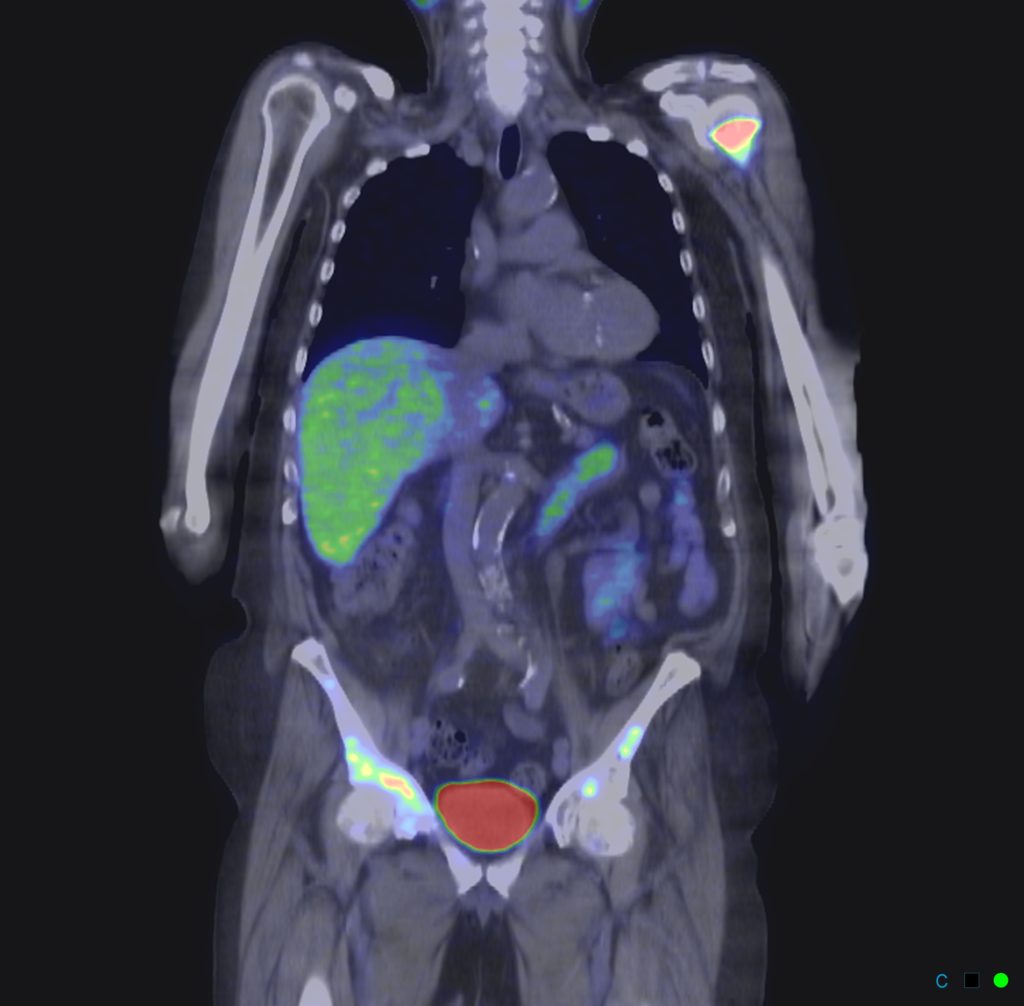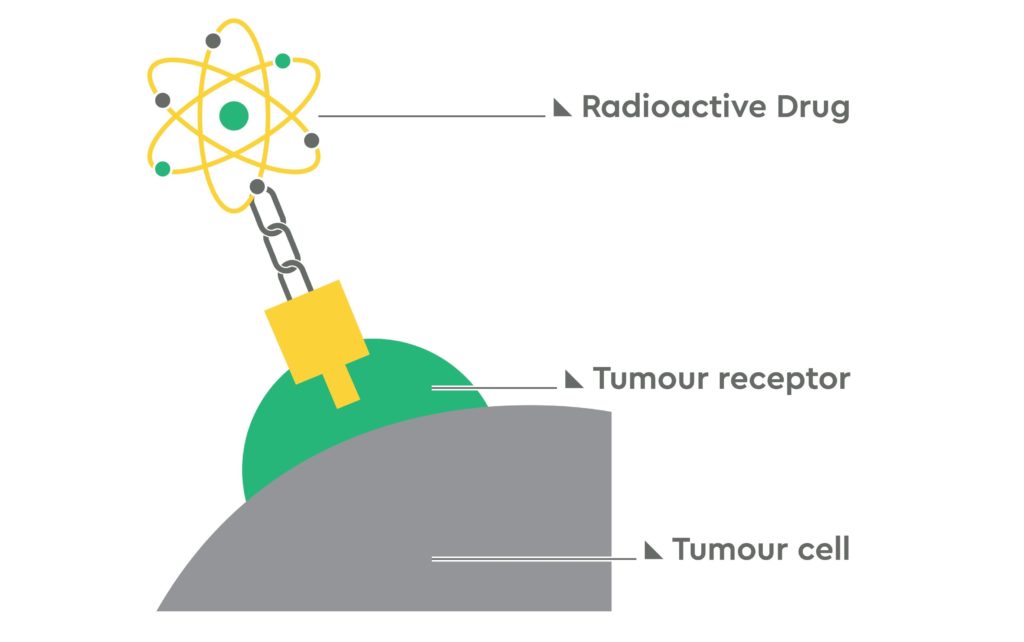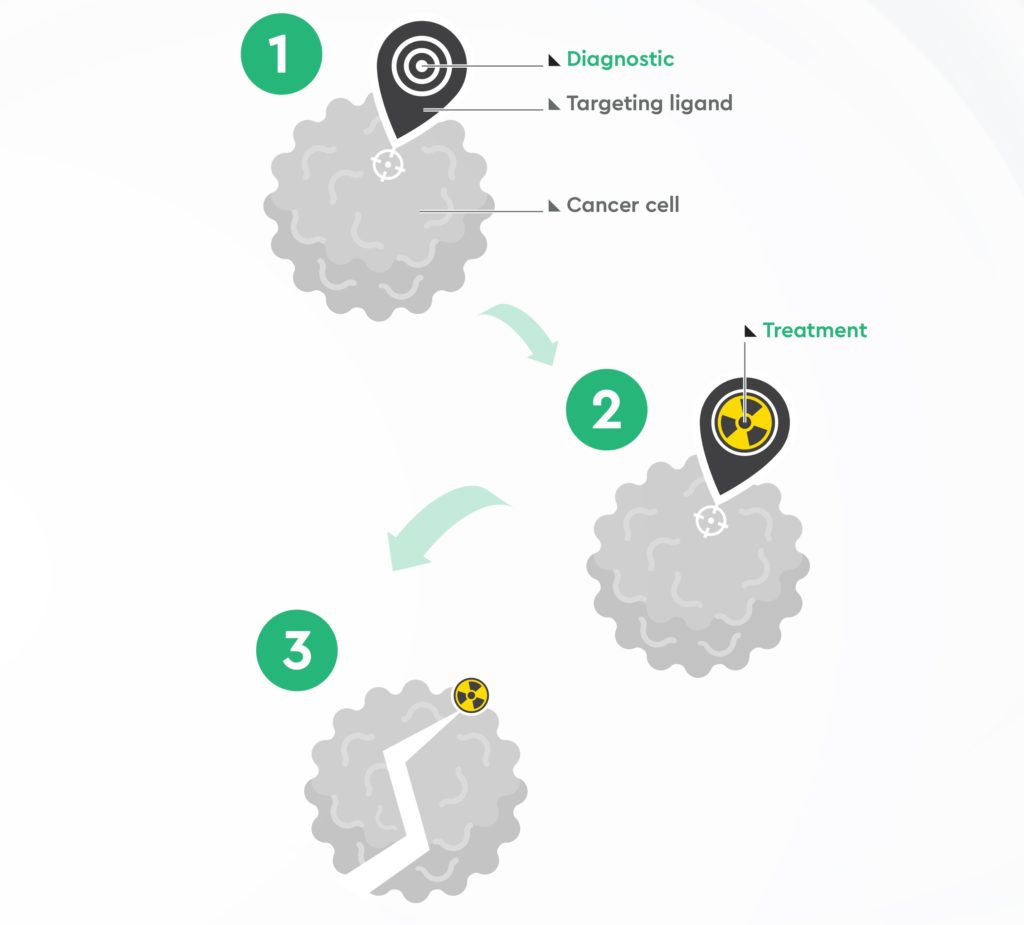Cancer remains one of the biggest causes of death in Australia. This year alone, an estimated 50,000 people nationwide will lose their lives to this complex and multifaceted disease – that’s about 140 of us each and every day.
Though the global and decades-long battle against cancer is seeing success, with increased survival rates in cancer patients overall, many forms of cancer remain incredibly difficult to treat.
We’re working hard to change that.
Through a new partnership with one of Australia’s largest cancer care providers and an emerging area of science called theranostics, we’re working to develop new therapies to fight even the most ‘untreatable’ cancers, and trial them right here in Australia.

A PET scan shows metastasised prostate cancer cells glowing in red in the shoulder and pelvis from the specially designed theranostic “homing missiles”. (Image: GenesisCare)
New treatments, faster
On the whole, cancer survival rates have improved, but people diagnosed with the most lethal forms of cancer — such as pancreatic and lung cancer — still have less than a one in five chance of surviving at least five years after their diagnosis. In fact, these types of cancers cause more than half of all cancer-related deaths.
Those who have metastatic cancer (where their cancer has spread to other parts of their bodies) face a similar distressing prognosis with very little available to them in terms of treatment.
Our new partnership with GenesisCare — one of the country’s largest cancer care providers — is powering the research we need to bring new, highly targeted therapies to patients suffering from some of the most fatal types of cancers including brain, pancreatic, ovarian cancer and metastatic cancers.
Our work with GenesisCare means that Australians will get access to any new therapies that are developed before the rest of the world because clinical trials will be based in Australia.
So, what sets theranostics apart from conventional cancer treatments?

The specially designed molecules, carrying a radioactive drug, seek out and attach themselves to unique cell signatures (‘tumour receptors’) on the surface of the cancer cells. The radioactive drug can then attack the cancer cell. (Image: GenesisCare)
Therapy + diagnostics = theranostics
Conventional cancer treatments today typically take a ‘one-size-fits-all’ approach; that is, patients receive the same treatment as others who have the same type and stage of cancer. But people can respond very differently to the same treatment, and its success varies.
That’s where theranostics comes in. Theranostics is a type of precision medicine which can be used to provide highly targeted cancer treatment, using molecular level diagnostics and therapy to find and attack individual cancer cells in a person’s body, leaving the neighbouring healthy cells alone. This is quite unlike systemic cancer treatments such as traditional chemotherapy, which can attack both cancerous and healthy cells, often causing debilitating side-effects for the patient.
Our scientists will be working to discover the unique signatures that are present for the cancer types we’re looking to treat, and then design special molecules to find and attach themselves to those cells. These molecules can then show us exactly where the cancer is located in the body, and deliver radiation directly to the cancer cells.
You can think of these molecules as ‘homing missiles’ that find and latch onto cancerous targets, allowing for highly targeted drug delivery.
You may not know it, but theranostics is already being trialled to better treat prostate and neuroendocrine cancers —with a rapidly developing body of evidence.

Specially designed molecules (‘targeting ligand’) seek out specific cancer cells. If they carry a diagnostic (1) they can show the exact location of the cancer cells in a scan, or if they carry a radioactive treatment (2) they can deliver the treatment straight to the cancer cell. (Image: GenesisCare)
The future of health monitoring and treatment
This new project is one of many we’re working on as part of our Probing Biosystems Future Science Platform: a multi-year, multi-disciplinary investment in our collective future, through devices and systems for real-time health and well-being monitoring.


16th May 2019 at 10:20 am
I have lost three siblings to Pancreatic cancer, I am very nervous about the possibility of other siblings and myself getting this deadly cancer which has no symptoms in earlier stages, Once it is diagnosed then it would have advanced too far and no treatment possible.
I pray God to help you people to find a cure.
16th May 2019 at 10:19 am
And why not also attach a marker that the immune system recognises, so it attacks the malignant cell?
16th May 2019 at 12:16 pm
Hi Henry,
As cancer treatment is complex, we are exploring various types of treatments and therapies to add to the treatment ‘toolbox’. While this project is focusing specifically on radiotherapy, we will be looking to explore other treatment possibilities, including immunotherapy.
Thanks for your interest,
Kate from the CSIRO communications team.
12th May 2019 at 11:22 am
Amen to that
10th May 2019 at 4:09 pm
Check out the following web sites
Focused Ultrasound http://www.cancerresearchuk.org/about-cancer/cancers-in-general/treatment/other/high-intensity-focused-ultrasound-hifu
Ferrite cancer traps http://www.bbc.com/news/health-34191325
Dr. Hogg http://www.news.com.au/lifestyle/health/health-problems/the-accidental-cure-for-cancer-potentially-found-as-medical-trials-begin-to-test-it-on-humans/news-story/576b4623958116a38b2fc17ccbfe3ea7
9th May 2019 at 2:08 pm
I hope you do it quickly. Metastacised bowel cancer would also be appreciated.